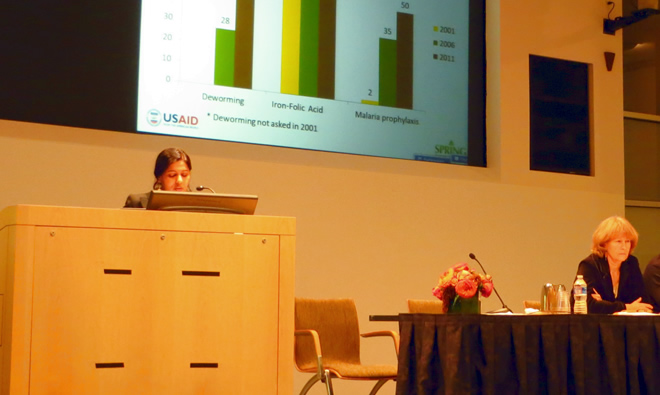
“Addressing anemia really is a multisectoral challenge,” remarked BethAnne Moskov, Deputy Director of the Office of Health, Infectious Diseases, and Nutrition in USAID’s Global Health Bureau in her opening speech to the participants of the Multisectoral Anemia Partners Meeting. Recognizing this challenge, and the need for a multisectoral approach, USAID created a Multisectoral Anemia Task Force Secretariat comprised of five partners: USAID, CORE Group, MCHIP, FANTA, and SPRING. Representatives from USAID sectors including Water, Sanitation and Hygiene (WASH), Neglected Tropical Diseases (NTDs), Food for Peace, and the President’s Malaria Initiative are also key members of the secretariat. These partners organized the Multisectoral Anemia Partners Meeting to bring together key stakeholders from across various sectors that have an impact on anemia. The goal of the meeting was to identify ways to collaboratively address the multiple causes of maternal and child anemia at the global and country level.
The first part of the meeting focused on examining frameworks for anemia programming and the anemia task force goals and objectives. A panel discussion followed which focused on the contribution of multiple sectors and practices to anemia prevention and control. The topics of the discussion included the Anemia Prevention and Control Toolkit, child health and anemia, malaria, agriculture, helminths, NTDs, and WASH.
After lunch, a World Café was held to facilitate discussion and collaboration on specific coordination and topical areas. Meeting participants rotated between several simultaneous round table discussions based on their interests and were encouraged to participate in topics outside their current scopes of work.
The anemia prevention community was well represented at the meeting; 76 people attended in person, and over 60 people registered for the online webinar. Additionally, SPRING, CORE Group, and MCHIP live-tweeted the event using a custom hashtag (#AnemiaMeeting). Post-event feedback showed that participants felt the meeting had provided an excellent platform for technical experts to both share their work and learn from professionals in other sectors.
The Secretariat is hopeful that the participants will apply the work done at this meeting to help advance progress on global targets to decrease anemia and reduce maternal and neonatal deaths, as well as improve health, productivity, and economic development.
A recording of the meeting and copies of the presentations given are available here.